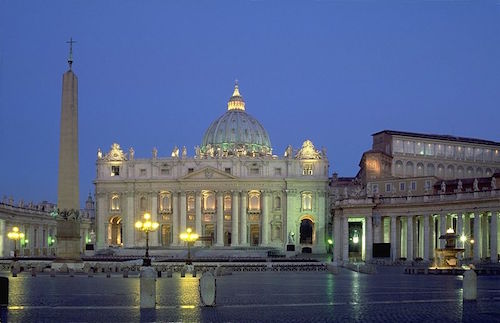 Evolution
Evolution
 Faith & Science
Faith & Science
 Intelligent Design
Intelligent Design
On Evolution, Vatican Newspaper Gets It Mostly Right

Jerry Coyne has taken to task a Catholic priest named Carlo Maria Polvani for writing to criticize the theory of evolution in the Vatican newspaper, L’ Osservatore Romano. Coyne is doubly annoyed, first that a religious person would dare to criticize evolution, and second that he would get it wrong ("Vatican newspaper screws up the theory of evolution before criticizing it"). I believe Father Polvani got it mostly right.
The good father (who also happens to be a PhD biochemist) is clearly not a native English speaker, and some errors of content therefore may be attributed to misspeaking, but it is also true that his basic premise is flawed. He uses the fact that penguins are present only in the Southern Hemisphere and not the Northern as his disproof of evolution. The problem lies in his idea that evolution works automatically and uniformly. No evolutionary biologist makes that claim. In fact, the contingency of evolution is one of the arguments made to explain just such patchy and sometimes surprising distributions of animals.
So the penguin example was poorly chosen. There are other things that he mentions in passing that could easily have been expanded to make a better case, though.
1) Scientists offer differing ad hoc stories to explain the same behavior or trait, for example in sociobiology. In other disciplines, such as molecular evolution, they make claims of changes in DNA as being due to adaptation, but without evidence (see Austin L. Hughes, "The origin of adaptive phenotypes," PNAS 2008, vol. 105:13193-1).
2) Many evolutionary stories are tautologies: We assume Y to be true. Y implies this explanation for X. We observe X. Therefore Y is true. An example of this logical problem was recently displayed in a piece I wrote called "Is Evolution True? Laying Out the Logic."
3) When contradictory evidence is found, alternate evolutionary explanations are claimed, or the evidence is denied or contested. Junk DNA is a prime example. Coyne claims that the remnants of broken genes prove evolution. I suppose he would say the same about the huge numbers of mobile genetic elements in our genome. Yet we have increasing evidence that most of these elements are active biochemically, and many are involved in regulating gene expression or post-transcriptional modification. They are not evolutionary detritus. The response to this unexpected and unpredicted result has been simply to deny it.
There are some things Father Polvani gets right, though. Coyne of course ignores those. For instance, Father Polvani mentions the knee-jerk name-calling and labeling any suggestion that Darwin might be wrong as "crypto-creationism of religious fundamentalist stamp."
He also mentions three areas where current work is being done as illustrations of how evolutionary thinking fails: the origin of life, the Cambrian explosion, and the statistical insufficiency of chance to account for phenotypic diversity (in protein evolution, perhaps). These are critiques Stephen Meyer discusses in Signature in the Cell and Darwin’s Doubt. I think Father Polvani has been reading Steve Meyer’s books. Father Polvani also mentions by name Michael Behe’s irreducible complexity and Darwin’s Black Box, and William Dembski’s specified complexity and The Design Inference. Perhaps he has read their books as well. All this is couched in a carefully worded way, indicating he isn’t yet prepared to endorse intelligent design, just our critiques.
He rightly points out that evolution should be falsifiable. Coyne responds by choosing his own examples of ways to falsify evolution, while ignoring the ones that already exist. See above.
I like his closing sentences, which I amend slightly here:
The main threat to the scientific integrity of the theory of evolution, in fact, does not come from an alleged invasion of the field by theology [or intelligent design], but rather from the incapacity of a certain self-referential science to recognize when it is time for a paradigmatic change, as philosopher Thomas Samuel Kuhn (1922-1996) indicated in The Structure of Scientific Revolutions (1966), noting ironically that "only when they must choose between competing theories do scientists behave like philosophers."
My apologies to philosophers.
Image by Andreas Tille (Own work) [GFDL or CC BY-SA 3.0], via Wikimedia Commons.
